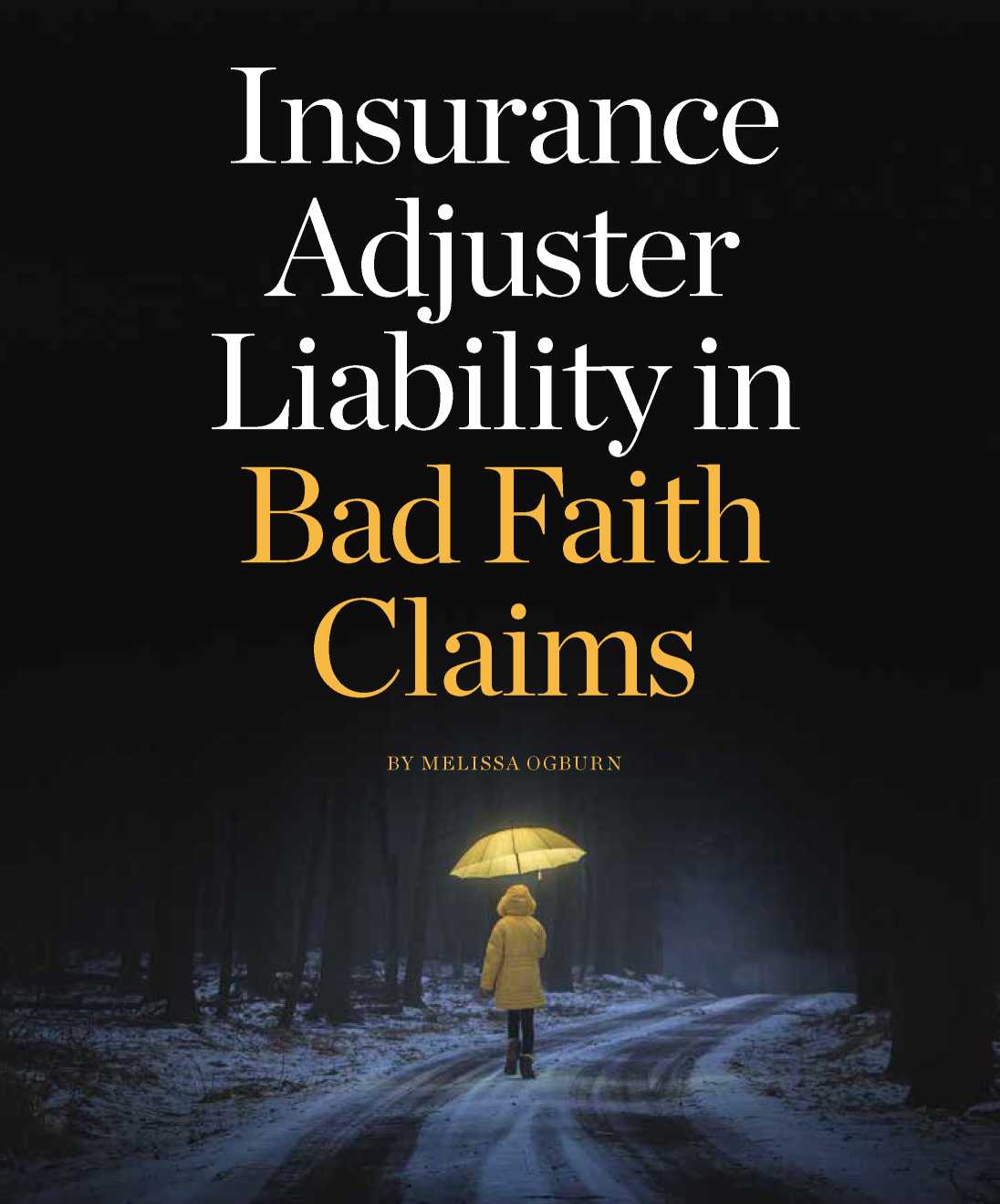Insurance Adjuster Liability in Bad Faith Claims
| Publication year | 2022 |
| Pages | 42 |
TORT AND INSURANCE LAW
by Melissa Ogburn

This article discusses whether individual insurance adjusters can be held personally liable for bad faith for failing to act reasonably in adjusting a claim.
On March 14, 2022, the Colorado Supreme Court issued its ruling in Skillett v. Allstate Fire and Casualty Insurance Co., answering the question of whether insurance adjusters themselves—not just their employers—can be held liable for unreasonably delaying or denying benefits under an insurance policy under CRS §§ 10-3-1115 and -1116. This article addresses legislative history and court decisions affecting individual insurance adjuster liability.
History of Bad Faith Cases
Colorado has historically recognized bad faith claims against insurance providers under common law. However, in 2008, the Colorado General Assembly enacted HB 08-1407, which amended Colorado statutes governing insurance companies' conduct by adding two new sections: CRS §§ 10-3-1115 and -1116. The House Bill's title indicated that the new sections were directed to insurance companies, not individual adjusters. It was titled, "An Act Concerning Strengthening Penalties For The Unreasonable Conduct Of An Insurance Carrier, And Making An Appropriation In Connection Therewith."[1]In general, those provisions prohibit "a person engaged in the business of insurance" from "unreasonably delay[ing] or deny[ing] payment of a claim for benefits" to a "first-party claimant."[2]CRS § 10-3-1116 states that violations of CRS § 10-3-1115 carry a penalty of "reasonable attorney fees and court costs and two times the covered benefit." But CRS § 10-4-1114 was also amended to state, "Except as provided in sections 10-3-1115 and 10-3-1116, nothing in this part 11 shall be construed to create a private cause of action based on alleged violations of this part 11 or to abrogate any common law contract or tort cause of action." Piecing these
"Piecing these phrases together, claimants have argued that not only can the insurance company be held liable for damages arising from the improper handling of a claim, but insurance adjusters themselves are equally liable."
phrases together, claimants have argued that not only can the insurance company be held liable for damages arising from the improper handling of a claim, but insurance adjusters themselves are equally liable.
Addressing Individual Adjuster Liability
Riccatone v. Colorado Choice Health Plans[3]was the first Colorado appellate decision to address whether the individual insurance adjuster handling the claim can be held liable for damages under CRS §§ 10-3-1115 and -1116. In 2007, 16-year-old Ashlee Duran sustained severe injuries resulting from a single-vehicle motor vehicle accident.[4] After the accident, authorities tested her blood and found alcohol present in her blood samples. At the time of the accident, plaintiffs Kirsten Riccatone, Brian Riccatone, and Duran were plan participants under the San Luis Valley Combined Educators Health Plan (Plan), an employer self-funded health care plan. Defendants Colorado Choice Health Plans, doing business as San Luis Valley Health Maintenance Organization (collectively, Choice), served as the Plan's current third-party administrators; defendant CNIC Health Solutions, Inc. (CNIC) was the Plan's former third-party administrator; and Gallagher Benefit Services, Inc. (GBS), later added as a defendant, was the Plan's broker and advisor. Upon learning that Duran's blood tested positive for alcohol, the Plan denied benefits to the plaintiffs, citing a provision that excluded coverage for injuries sustained as a result of the illegal use of alcohol.[5]
CNIC was granted summary judgment, and although the plaintiffs eventually entered into a settlement with the Plan, they doubled down on their claims against GBS and Choice by moving for leave to amend their complaint to add claims for aiding and abetting tortious conduct.[6] They also sought reconsideration of the summary judgment order in favor of CNIC. The trial court denied the plaintiffs' motion for leave and affirmed summary judgment in favor of CNIC. The plaintiffs appealed.[7]
On appeal, the Court of Appeals agreed with the trial court that defendants CNIC, GBS, and Choice did not owe common law duties of good faith and fair dealings to the plaintiffs and thus could not be held liable for common law bad faith.[8] After reviewing the legal history on the subject, the court ultimately upheld the standards set forth in Cary v. United of Omaha Life Insurance Co.,[9] finding that "the duty of good faith and fair dealing supporting a bad faith claim extends to third parties who (1) perform the functions of an insurer and (2) have a financial incentive to limit an insured's claims."[10] Concluding that CNIC, GBS, and Choice did not meet these criteria, the court affirmed the district court's ruling.
Significantly, the Court of Appeals affirmed the district court's summary judgment order pertaining to the statutory claims, again finding that the defendants were not proper parties to such claims. The court's ruling hinged on whether any of the defendants qualified as "a person engaged in the business of insurance," as required by CRS § 10-3-1115. The court first noted that the Colorado General Assembly did not define the phrase "a person engaged in the business of insurance."[11] In fact, the General Assembly did not even define the narrower phrase "business of insurance." But the legislature did define the duties and responsibilities of the "insurer" in CRS §§ 10-3-1115 and -1116. Additionally, the more general statutes under title 10, particularly CRS § 10-1-102(13), define "insurer" as a "person engaged as principal, indemnitor, surety, or contractor in the business of making contracts of insurance." Further, "insurance" is defined as "a contract whereby one, for consideration, undertakes to indemnify another or to pay a specified or ascertainable amount or benefit upon determinable risk contingencies, and includes annuities."[12] The court concluded that the reasonable interpretation of "person engaged in the business of insurance" must mean "a person who "˜undertakes to indemnify another or...
To continue reading
Request your trial
